White House Evaluates Response To Attack On US Base In Jordan
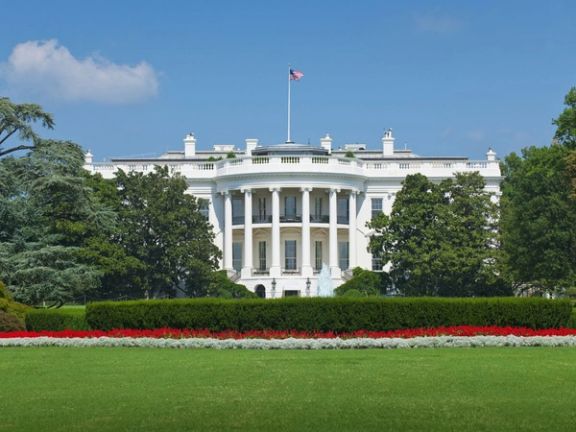
The White House is currently deliberating potential actions following a deadly assault on a US base in Jordan by militants backed by Tehran, said the Pentagon.

The White House is currently deliberating potential actions following a deadly assault on a US base in Jordan by militants backed by Tehran, said the Pentagon.
Major General Patrick Ryder, Press Secretary of the Department of Defense, said, “We will take necessary action to protect our forces, no matter where they're serving around the world. I'm not going to telegraph or forecast any potential response from the United States.”
“We will do whatever we need to do to protect our forces going forward. But certainly, at the end of the day, we are not looking to engage in a wider conflict merely to ensure regional security and stability,” he added.
The Sunday attack claimed the lives of three American soldiers, marking the first such deaths since the escalation of tensions triggered by the Israel-Hamas conflict in Gaza last October.
President Joe Biden faces mounting pressure to address the drone strike, refraining from directly implicating Tehran but attributing the assault to "radical Iran-backed militant groups" operating in Syria and Iraq. He pledged accountability for those responsible.
Meanwhile, the Iranian Foreign Ministry has denied involvement in the attack, dismissing allegations as "repetition of baseless accusations."
"The groups in the region do not take orders from Iran," Kanaani said. "War is not a solution. An immediate ceasefire in Gaza can lead to the return of peace."
Although Tehran has avoided direct military involvement in the Gaza war, its proxy forces in the region have attacked US troops 160 times since October.
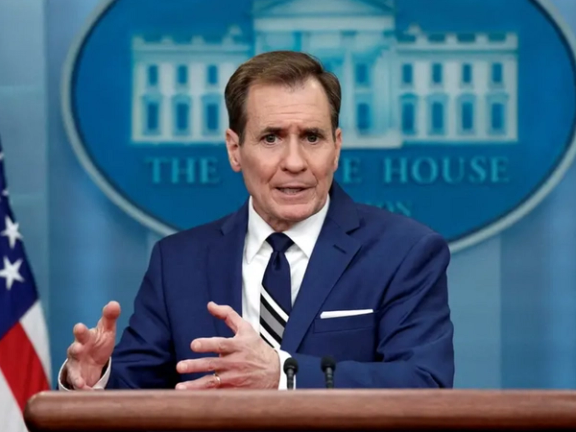
White House National Security official John Kirby said in an interview on NBC television, that the United States is not seeking conflict with Iran or regional escalation.
The national security council spokesperson reiterated the stance, stating, "We are not pursuing war with Iran nor escalating tensions in the region. Despite ongoing attacks, we are exploring available options." Kirby underscored the desire for a stable, secure, and prosperous Middle East while urging an end to the attacks.
President Joe Biden and US officials confirmed that three US service members were killed, and at least 34 were wounded in a drone attack by Iran-backed militants in northeastern Jordan near the Syrian border.
Biden condemned the attack, attributing it to radical Iran-backed groups operating in Syria and Iraq has vowed retaliation. The continuous missile and drone strikes targeting US troops since October, initiated after Israel's response to Hamas' actions, have now claimed American lives for the first time, crossing a perceived red line in Washington.
“We had a tough day last night in the Middle East. We lost three brave souls in an attack on one of our bases,” he said. Biden added, “and we shall respond.”
Despite previous warnings from critics of Biden's Iran policy, the loss of life has left the administration with few alternatives but to consider escalation.
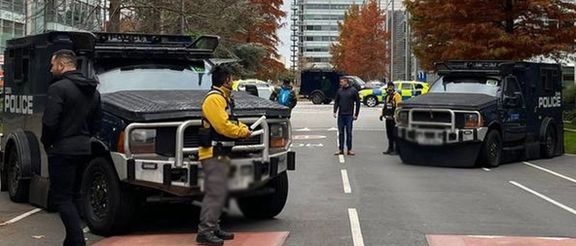
The US and UK have announced a sanctions package against a network involved in assassination plots targeting dissidents and including Iran International journalists.
The UK sanctions hit Iranian officials involved in threats to kill Iran International TV journalists on British soil. Sanctions were also imposed on members of organized criminal gangs who collaborate with the regime, “which seeks to export repression, harassment and coercion against journalists and human rights defenders,” according to a statement by the British government.
“The Iranian officials designated are members of Islamic Revolutionary Guard Corps (IRGC) Unit 840, which was exposed in an ITV investigation into plots to assassinate two television presenters of Iran International news on UK soil,” read the statement, referring to the latest credible reporting of the regime’s attempt to intimidate or kill British nationals or UK-linked individuals, with at least 15 such threats taking place since January 2022.
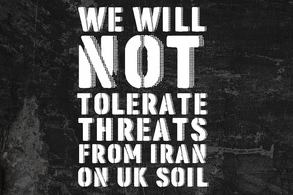
Mohammad Reza Ansari, an IRGC-Quds Force official, and Muhammed Abd al-Razek Kanafani were named in the ITV News report as coordinators of the plot to assassinate Iran International journalists. Ansari was previously designated by the US. He is the ‘mastermind’ behind failed plots to assassinate former US officials Mike Pompeo and John Bolton.
UK’s ITV revealed that the IRGC was plotting to assassinate two Iran International television anchors in London in 2022 amid Iranian anti-government protests. Iranian spies offered a people-smuggler $200,000 to target the network's headquarters in London with a car bomb. In November 2022, Volant Media, the parent company of Iran International, also announced that two of its journalists had been notified of direct threats. In December, the Central Criminal Court of England also sentenced a man arrested for gathering information on Iran International's London headquarters to 3.5 years behind bars.
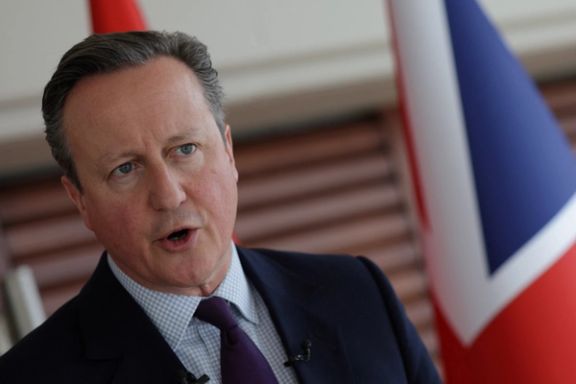
British Foreign Secretary David Cameron said, “The Iranian regime and the criminal gangs who operate on its behalf pose an unacceptable threat to the UK’s security. Today’s package exposes the roles of the Iranian officials and gangs involved in activity aimed to undermine, silence and disrupt the democratic freedoms we value in the UK."
The criminal gang targeted in the new sanctions package is led by Iranian narcotics trafficker Naji Ibrahim (Ebrahim) Sharifi-Zindashti and directed by Iran's Ministry of Intelligence and Security (MOIS), the US Treasury said. It added that Zindashti’s network has carried out assassinations and kidnappings across a number of jurisdictions, aiming to silence Tehran's perceived critics.
The MOIS and the IRGC have extensively pursued perceived regime opponents through transnational repression outside of Iran. The practice has intensified in recent years, targeting dissidents, journalists, activists, and former Iranian officials for assassination, kidnapping, and hacking operations across multiple countries in the Middle East, Europe, and North America.
Zindashti, has cooperated with the MOIS in various plots, including the abduction and execution of regime dissidents such as Habib Chaab, Saeed Karimian and Masoud Molavi-Vardanjani.
In 2020, as part of an MOIS-sponsored operation, Chaab -- a leader of the Arab Struggle Movement for the Liberation of Ahvaz (ASMLA) -- was abducted by Zindashti’s men in Turkey. Chaab was then smuggled into Iran where he was imprisoned, tortured, forced to confess under duress, and ultimately convicted following a trial without due process of law. He was executed in May 2023.
In 2019, the MOIS used Zindashti and his men to assassinate former Iranian cybersecurity official turned regime critic Masud Vardanjani in Istanbul. Vardanjani, who was outspoken in his condemnation of the Iranian regime, publicly disclosed documents exposing financial corruption and assassinations by the regime via his Telegram channel.
Also in 2017, British-Iranian dissident Saeed Karimian, who owned GEM TV network and used it to broadcast content critical of the Iranian regime, was shot and killed in Istanbul along with Kuwaiti businessman Muhammad Mer Almuntari. Zindashti was later discovered to be behind the double murder.
“The Iranian regime’s continued efforts to target dissidents and activists demonstrate the regime’s deep insecurity and attempt to expand Iran’s domestic repression internationally,” said US Under Secretary of the Treasury for Terrorism and Financial Intelligence, Brian E. Nelson.
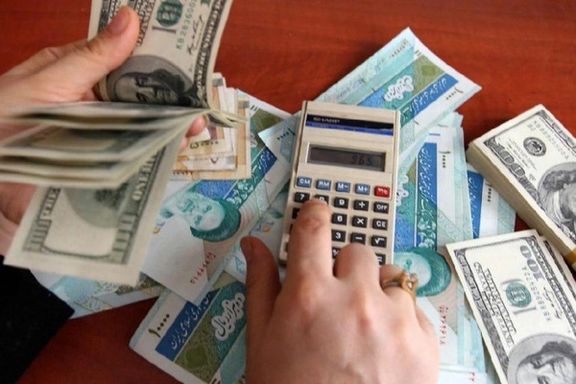
Iran’s currency, rial, hit an all-time low on Monday amid fears of US retaliation for a drone attack over the weekend that killed three American servicemen in Jordan.
The US dollar rose to more than 584,000 rials, the highest since February 2022, when it briefly traded at that level. The euro topped 630,000 and the British pound reached 740,000 rials.
President Joe Biden announced on Sunday that Iranian-backed militia were responsible for striking a US base near the Jordanian and Syrian border killing 3 and injuring more than 30 service members. Later in the day, he vowed retaliation against those responsible.
This brings the rial’s fall to more than 15 percent since the beginning of January, when tensions began to rise with attacks on international shipping by Iran-backed Houthis and US retaliatory strikes.
The Iranian currency, which has steadily lost value since the 1979 revolution, began depreciating in 2018, when then-president Donald Trump withdrew from the JCPOA nuclear deal and imposed sanctions on Iran. Since then, the dollar rose from 42,000 rials to more than 580,000. Before the establishment of the Islamic Republic in 1979, the dollar traded at 70 rials.
With annual inflation hovering above 40 percent for three years, the Iranian government faces a precarious situation. The fall of the rial is bound to fuel more inflation and the impoverishment of the population, which is already facing rising prices.

The head of Iran's Foundation of Martyrs and Veterans Affairs disclosed on Monday that medications crucial for veterans of the Iran-Iraq war are not readily available in the country.
Speaking to ILNA news agency, Amir-Hossein Ghazizadeh Hashemi claimed, "Our issue is not financial; it's the availability of the medicines in the market. This year, we didn't have financial problems, meaning it wasn't about money; the problem was the absence of medications. The drugs should be available in the market so that the foundation can provide them to veterans."
Highlighting the necessity for medicines addressing "neurological and psychological" issues stemming from the eight-year war (1980-1988), Ghazizadeh Hashemi stated, "I am aware of the predicament. Sometimes we import them inappropriately in suitcases, which is not the correct method."
Reports in recent months have surfaced regarding the scarcity and soaring prices of various medications in Iran, coupled with the bankruptcy and closure of pharmaceutical companies. Additionally, there are indications of several Iranian pharmaceutical firms relocating to neighboring countries to sustain operations.
Importing medicine is controlled by the government, which should appropriate foreign currency to both public and private sector importers. Annual imports of medications and pharmaceutical raw materials costs more than $2 billion.
Iranian authorities attributing the medicine shortage in the country to sanctions, but the United States insists that medicine is not among the sanctioned items, maintaining that Iran can import it.
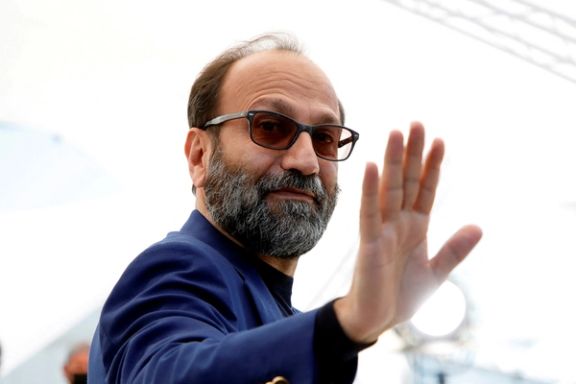
Prominent Iranian filmmaker Asghar Farhadi says he will not produce any films in Iran until the ban on showing women without headscarves is lifted, as people demand.
For decades, Iranian filmmakers, including Farhadi, have been compelled to depict female characters with their hair covered by a headscarf or a tightly fitted hat, along with loose-fitting clothing that conceals the neck, arms, and legs.
Farhadi says he will not cover women's hair in his films “systematically” as long as compulsory hijab rules are in place and Iranians defy the ban. “I will not make films in Iran as long as I am not free from this constraint,” he told Le Monde in an interview conducted last month on the sidelines of Les Arcs Film Festival in France where he chaired the jury.
The rule applies even when the characters are in places where they are supposed to have complete privacy in the story, such as their bedrooms. Filmmakers and screenwriters often must go to great lengths to avoid scenes where the appearance of the female characters in anything less than acceptable to the authorities may result in the scene being censored in pre-screening vetting by officials appointed to review films according to religious and political guidelines. Films can also lose permission for public screening.
Farhadi also told Le Monde that Iranian filmmakers persevered in creating films for four decades despite heavy censorship and repression, but in the past year film production has dropped hugely. “I can’t work in these circumstances, either.”
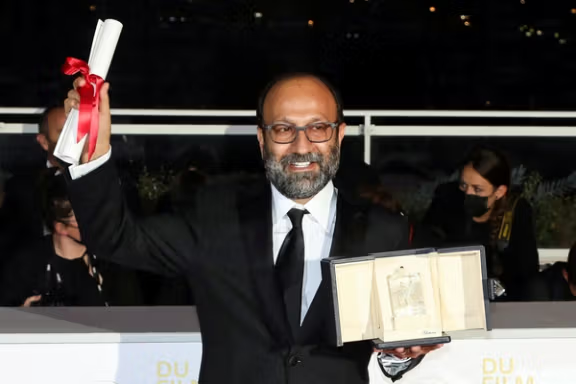
The director of the Academy Award winning “A Separation” and “The Salesman”, who had always insisted on staying in Iran, was criticized for often avoiding comments on political issues but like many of his colleagues, he openly supported the Woman, Life, Freedom Movement in 2022.
“I’m restless and disgusted since reading the news, this time with myself,” he wrote in an Instagram post he addressed to Mahsa Amini who fell into a coma after receiving a head injury during her arrest by the morality police in September 2022 for what they considered as “inadequate hijab”.
“Faced with this boundless cruelty, we pretend we are sleeping. We are partners in this crime,” he wrote.
In another post he urged all artists, filmmakers, intellectuals, and rights activists around the world to show solidarity with Iranian men and women by making videos, writing articles or any other way they could.
Later in April, he told Variety Magazine that he was not totally sure he would be allowed to leave the country again if he went back to Iran, as he planned to do at the time before starting to shoot his new film in the US.
“I’m not officially aware of being banned from working in Iran, but I have heard it unofficially. Moreover, I know that I’m officially banned from any business transactions. And again, unofficially, I have heard that I am banned from leaving Iran,” he said.
Farhadi’s passport was taken from him upon returning to Iran two years after winning his Academy Award for best foreign film in 2011. He was also interrogated at the airport and called in by intelligence agencies.
Many Iranian actors and other artists who publicly supported the Mahsa movement and fused to wear hijab were banned from working by the authorities. Some, like Taraneh Alidoosti who appeared in Farhadi’s Separation, and Katayoun Riahi were arrested and prosecuted for hijab rebellion.